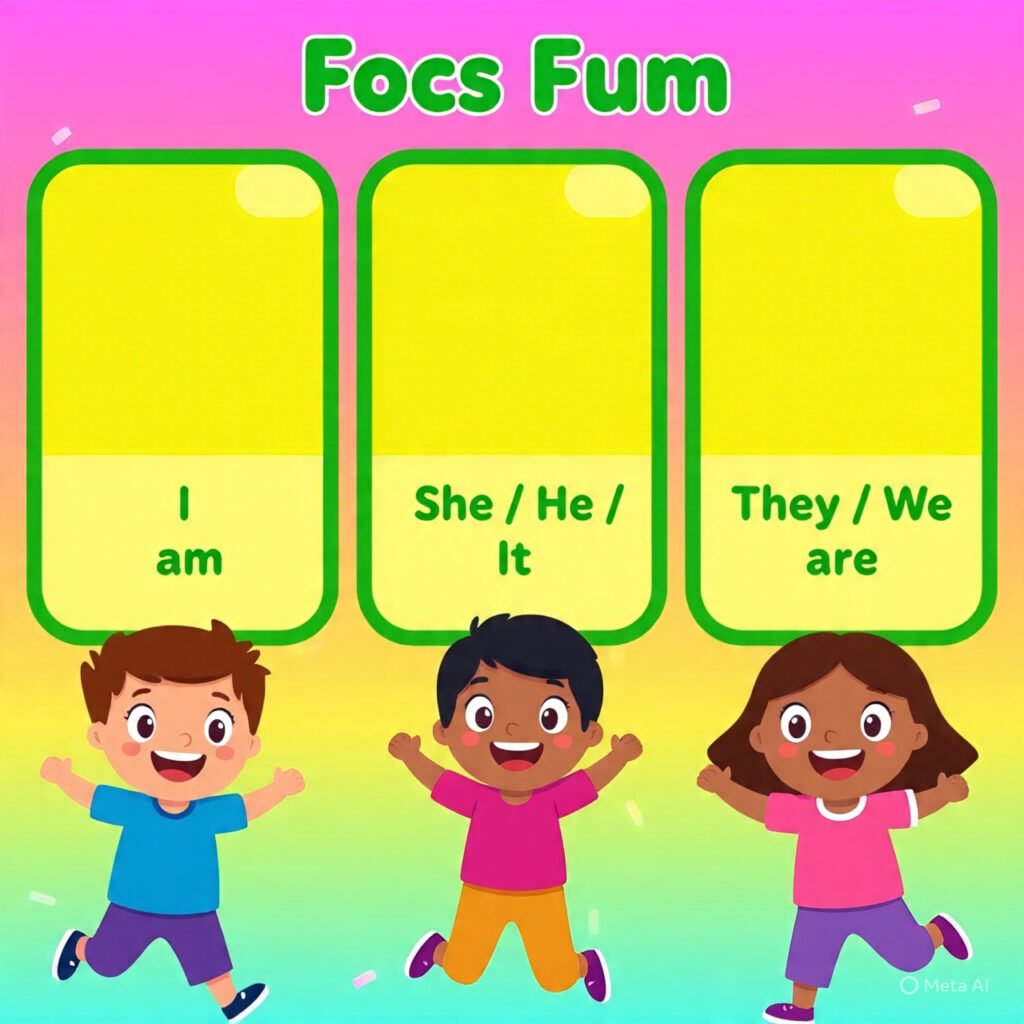Table of Contents
Introduction

English grammar and vocabulary are the backbone of effective communication. But let’s face it—traditional grammar drills can sometimes feel boring for students. That’s where Grammar Games-Based Vocabulary Boosters for Class 4–5 come into play. These activities turn learning into an exciting adventure, keeping kids engaged while they sharpen their language skills.

Whether it’s vocabulary games for 4th grade, parts of speech games, or fun grammar activities for kids, game-based learning creates an environment where students actively participate and retain more knowledge.
In this blog, we’ll explore:
- The benefits of grammar games for Class 4–5 students
- Examples of engaging online, classroom, and printable activities
- How Focus Fun games can make English learning effective and enjoyable
Why Game-Based Learning Works for Grammar and Vocabulary
1. Boosts Engagement
Games turn lessons into interactive experiences, making learning feel like play rather than work.

2. Improves Retention
When students learn grammar rules through activities like sentence building or word association, they are more likely to remember them.
3. Encourages Teamwork
Many grammar games for 4th–5th grade are designed for group play, helping students learn from each other.
4. Promotes Independent Learning
Online grammar games for students encourage self-paced practice, allowing them to progress without pressure.
Online Grammar & Vocabulary Games
Technology has made grammar learning more interactive than ever. Here are some top online grammar games for students in Class 4–5:

1. Focus Fun – Connect Shape
A unique twist on vocabulary learning, Connect Shape challenges kids to connect words or letters to create meaning while identifying shapes. For English learning, teachers can adapt it to match synonyms, antonyms, or parts of speech with shapes.
2. Focus Fun – Quiz Games
Multiple-choice quizzes keep students sharp on grammar rules like verb tenses, punctuation, and vocabulary definitions. Teachers can create thematic quizzes based on recent lessons.
3. Focus Fun – Memorize
A memory card game where students match words with meanings, parts of speech, or images. Perfect for vocabulary retention.

4. Focus Grammar Quizzes
Interactive online quizzes that make grammar competitions exciting. Teachers can host live sessions or assign homework challenges.
5. Grammar Gorillas (FunBrain)
Kids identify parts of speech in sentences to earn points—great for parts of speech games.
💡 Pro Tip for Parents: Use online games for short, 10–15 minute daily grammar workouts to keep kids consistent without overwhelming them.
Classroom Grammar Game Activities
In-person games create an engaging environment where students interact and learn together.
1. Sentence Scramble Challenge
Give students jumbled words and ask them to form correct sentences. This builds sentence structure awareness and grammar accuracy.
2. Focus Fun – Shape Drag and Drop
While originally designed for shape recognition, it can be adapted for dragging vocabulary words into categories like nouns, verbs, and adjectives.
3. Verb Charades
Students act out a verb while classmates guess. Fun grammar activities for kids like this build active vocabulary.

4. Word Association Relay
Divide the class into teams. The first student says a word, and the next must say a related word in the correct grammatical form.
5. Punctuation Detective
Provide a paragraph with missing punctuation. Students work in pairs to fix errors.
How Focus Fun Boosts English Learning
The Focus Fun app offers targeted grammar and vocabulary practice that aligns with Class 4–5 learning needs. By integrating games like:

- Connect Shape – Builds word association and logical thinking
- Quiz Games – Sharpens grammar recall speed
- Memorize – Strengthens long-term vocabulary retention
- Shape Drag and Drop – Enhances categorization skills in grammar
- Bubble Click – Improves quick recognition of word meanings and grammar roles
- Flag Colour – Can be adapted to teach country names, adjectives, and related vocabulary

These games blend fun with structured learning, helping students improve spelling, sentence formation, and vocabulary usage—all essential for strong communication skills.
Practical Tips for Teachers & Parents
- Set a Routine: Dedicate 10–20 minutes daily to grammar games.
- Mix Formats: Rotate between online, classroom, and printable resources.
- Track Progress: Use apps like Focus Fun to monitor improvement.
- Adapt Games: Modify game rules to suit different grammar topics.
Conclusion

Grammar Games-Based Vocabulary Boosters for Class 4–5 aren’t just fun—they’re a powerful way to improve language skills. By combining online grammar games for students, interactive classroom activities, and printable vocabulary games, parents and teachers can create a balanced, engaging learning environment.
With tools like Focus Fun, learning English becomes not only effective but also exciting. Students don’t just memorize rules—they understand and apply them naturally. And that’s the real win.
FAQ
What are grammar games

Grammar games are interactive activities designed to help students practice grammar rules in a fun and engaging way. They replace boring worksheets with creative challenges, quizzes, and puzzles.
Can grammar games improve my child’s writing skills?

Yes! Grammar games help children understand sentence structure, punctuation, and word usage without feeling pressured. When kids enjoy grammar learning through games, they naturally apply the rules in writing, leading to stronger essays, stories, and homework performance.
What are some examples of grammar games for classrooms?
Some popular classroom grammar games include “Sentence Building Race,” “Grammar Bingo,” “Verb Charades,” and “Correct the Sentence Challenge.” These activities turn grammar practice into teamwork, competition, and laughter.
Can I play grammar games online for free?
Yes! Many websites and learning platforms offer free grammar games for kids and adults. These online versions are great for home learning, as they often include colorful animations, instant feedback, and fun challenges.
How do grammar games keep students engaged?
Grammar games turn abstract rules into real-life challenges. For example, instead of just memorizing verb forms, students might match verbs with pictures, race to fix sentences, or drag-and-drop words to complete a story. The play factor keeps them engaged far longer than traditional drills.
